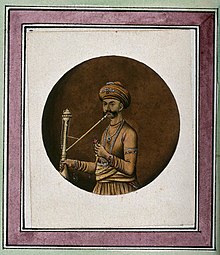| Nawab Muzaffar-Jang Diler Himmat Khan | |
|---|---|
|
Nawab of
Farrukhabad Muzaffar Jang | |
 The Nawāb of Farrukhabad, Muzaffar Jang, smoking a hookah | |
| Nawab of Farrukhabad | |
| Reign | 1771-1796 |
| Predecessor | Ahmad Khan Bangash |
| Successor | Imdad Hussain Khan Bangash |
| Born | Diler Himmat Khan September 1757 - September 1758 |
| Died | 22 October 1796 |
| Issue | Rustam Ali Khan Bangash, Imdad Hussain Khan, seven daughters (see Issue) |
| House | Bangash |
| Father | Ahmad Khan Bangash |
| Religion | Islam |
Nawab Diler Himmat Khan, commonly known by his regnal name Muzaffar Jang (1771-1796) was the fourth Nawab or ruler of Farrukhabad, a kingdom in Medieval India. He succeeded his father Ahmad Khan Bangash as the ruler in 1771. [1] [2] [3] [4] [5]
Early life and background
Diler Himmat Khan was born to Nawab Ahmad Khan Bangash and his fourth wife, Khair-un-nissa in September 1757 - September 1758. His father was a leading noble in the Mughal Empire and ruled Farrukhabad as his ancestral domain. [3] Diler Himmat Khan's mother, Khair-un-nissa was the adopted daughter of Yakut Khan, one of Ahmad Khan's salves and reportedly a descendant of Khan Jahan Khan Lodi, the principal Afghan noble during the reign of Mughal emperor Shah Jahan. [6] [7] Diler's birth was much rejoiced at and he was given the title of Muzaffar Jang by his father. [3] [2]
Reign
On his father's death in 1771, Diler Himmat Khan succeeded him as the Nawab of Farrukhabad. [1] [3] Early in his reign, he was forced to seek the aid of the ruler of Awadh, Shuja-ud-Daula in 1773 to expel the Marathas who had attacked Farrukhabad. According to a "Hamilton", this Maratha army was actually a small raiding party. Hamilton held Muzaffar Jang in low opinion, stating him to be a weak and ignorant young man. [8] [4] [5] However, he became a tributary of Awadh in 1774 after the First Rohilla War. The British Governor-General of India, Lord Cornwallis considered Muzaffar Jang to be "either a madman or an idiot". [9] Muzaffar Jang died on 22 October 1796, allegedly poisoned by his eldest son Rustam Ali Khan. [10] [3]
Issue
Diler Himmat Khan had four consorts. He had nine children, of whom two were sons and seven were daughters. They are as follows in chronological order- [3]
- Rustam Ali Khan, eldest son who allegedly poisoned Diler Himmat Khan
- Imdad Hussain Khan, regnal name Nasir Jung, died 1st of February, 1813
- Umdah Begum, married to Himmat Bahadur
- Fazl-un-nissa, married to Muhammad Ali Khan, eldest son of Dil Daler Khan, son of Ahmad Khan Bangash
- Najib-un-nissa, married to Ahmad Ali Khan, second son of Dil Daler Khan. She died on 22nd of October, 1864.
- Nawab Begum, married to Hussain Ali Khan, son of Amin-ud-Daula. She died on 23rd of May, 1817.
- Amir Begum, married to Hasan Ali Khan, another son of Amin-ud-Daula. She died on 17th of August, 1842.
- Nadir Jahan Begum
- Unnamed daughter, married to Burhan Ali Khan
References
- ^ a b "Nawab Ahmad Khan Bangash | The Indian Portrait".
- ^ a b Beale, Thomas William; Keene, Henry George (1894). An Oriental Biographical Dictionary. W.H. Allen. ISBN 978-1-4047-0648-4.
- ^ a b c d e f "The Bangash Nawabs of Farrukhabad: 1713-1857". Journal of the Asiatic Society of Bengal. Calcutta. 1832. p. 49-165.
- ^ a b Garg, Sanjay (22 December 2022). The Raj and the Rajas: Money and Coinage in Colonial India. Taylor & Francis. ISBN 978-1-000-82889-4.
- ^ a b Arwine, William. Tarikh-e Farrukhabad, Vol. I (in Urdu). New Delhi: Archaeological Survey of India.
- ^ Gommans, Jos (22 December 2017). The Indian Frontier: Horse and Warband in the Making of Empires. Routledge. ISBN 978-1-351-36356-3.
- ^ "Abid - The Decapitation of Khan Jahan Lodi (3 February 1631)". www.rct.uk.
- ^ Strachey, Sir John (1892). Hastings and the Rohilla War. Clarendon Press. p. 131.
- ^ Welsch, Christina (25 August 2022). The Company's Sword: The East India Company and the Politics of Militarism, 1644–1858. Cambridge University Press. ISBN 978-1-108-98102-6.
- ^ Ahmad, Safi (1971). Two Kings of Awadh: Muhammad Ali Shah and Amjad Ali Shah, 1837-1847. P. C. Dwadash Shreni.